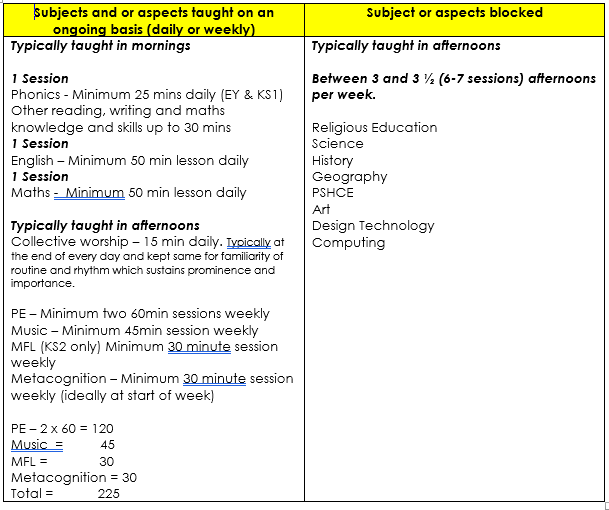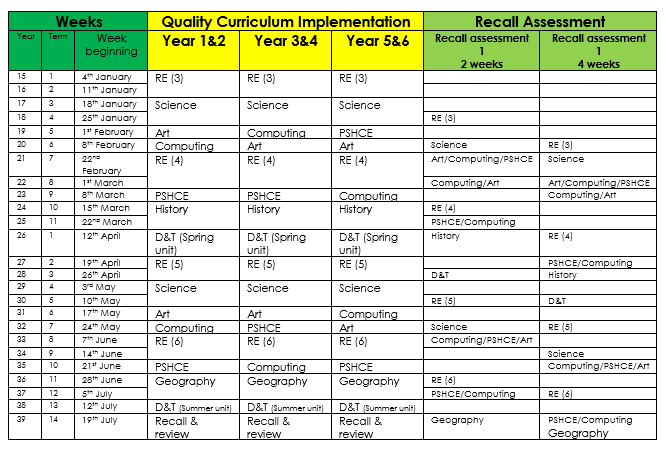Curriculum Implementation
Our vision translates directly into our curriculum in that:
LOVE
Our curriculum promotes a love and appreciation of life and learning in all its fullness, enabling children to realise a passion for the possible.
LEARN
Our curriculum enables children to learn and retain a body of knowledge to which they can develop and apply key critical thinking and communication skills becoming creative, confident and enquiring learners.
THRIVE
Building on their strengths, interest and experiences our curriculum enables children to grow and flourish both academically, socially and emotionally experiencing success in a range of situations and contexts.
Implementing Our Knowledge Rich Curriculum
Quality first curriculum implementation enables children to
*progress well knowing and remembering more.
*Progress is the alteration of long-term memory.
Carefully planned sequences mapped out over each phase and as outlined in our Federation Curriculum Map play a key role in quality first curriculum implementation.
In addition a clear and sharp focus on the core knowledge for each sequence plays an important part in helping children know and remember more.
Teaching emphasises the importance of knowing and understanding the key vocabulary associated with subject knowledge. Frequent low stakes recall such as quizzes support knowledge retention.
During a trial period in the autumn term of 2020 we saw children knowing and remembering more as a result of block teaching foundation subjects.
To build on this, we formalised our approach to block teaching from the Spring Term of 2021 and we have continued to follow this approach.
What is Block Teaching?
The teaching of the same foundation subject multiple times within the same week allowing the sequence to be delivered over one or two weeks.
Where ever possible the whole school teaches the same subject simultaneously to aid monitoring, moderation and evaluation. This is not possible in all subjects such as computing due to the need to share some resources across the whole school.
Block Teaching Rationale
Systematic blocked planning ensures all subjects are allocated quality focused time ensuring curriculum equity.
• It ensures no single subject or subjects are ‘squeezed out’ in cramped weekly timetables.
• Teachers focus on the quality of implementation as the intent (what and when) is systematically pre-determined.
• Facilitates effective building of sequential knowledge with shorter time periods between adding new knowledge onto existing.
• Provides meaningful opportunities to revisit and recap following a condensed sequence.
• Misconceptions can be addressed quickly and acted upon within the block.
• More effective use of time as not switching between different sets of resources.
• Assessment more meaningfully focused on one subject at a time and then revisited at key recall points.
• Positive impact on workload as teachers can focus on fewer subjects for specific periods.
• Teaching PE, music and MFL (KS2) on an ongoing basis provides a balance of the benefits of block teaching while also providing curriculum variety within each teaching week.
• Teaching PE on an ongoing basis helps children learn the physical and emotional benefits of regular physical activity.
• Music is a skills-based subject. Musicians continually developing their skills and abilities It is therefore beneficial and considered good practice for children to have regular weekly music. Any musical learning benefits continual practice and application in different contexts following a spiral skills-based curriculum.
• The teaching of MFL (KS2) on an ongoing basis allows regular short bursts of practice of vocabulary including at home.

Blocking Example

Recall assessments
There are two core purposes to our recall assessments
- Aid securing of knowledge in long term memory. Cognitive science indicates recall from long term memory is a more effective method of securing knowledge than revision (repeating learning).
- Identify children who have not yet secured the expected knowledge and support them.
Strategies to support children not yet secure in knowledge
- Provide knowledge organiser for child to take home to continue to work on learning
- Deliberate practice opportunities designed to secure the knowledge in school and or via home learning
- Additional recall opportunities in addition to the universal provision of 2 weeks and 4 weeks
